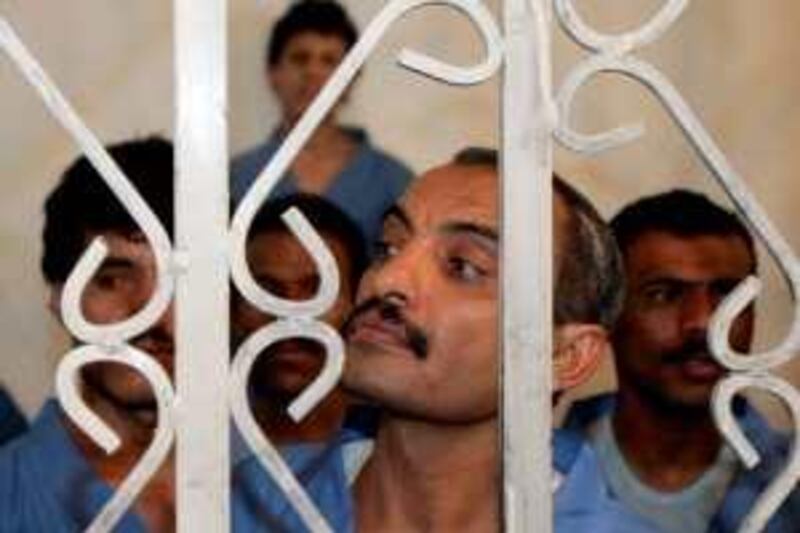SANA'A // A former military pilot who shot dead a Jewish teacher last December was sentenced to death by an appeals court yesterday. While the verdict was welcomed by the family of the victim, relatives and tribesmen of the convict were irate, and described the verdict as "shameful". "We consider the verdict a triumph for Islam, [a religion] that treats people equally and a correction for the primary court scandal," said Khalid al Anisi, who represented the family of Moshe Yaish al Nahari, who was killed last December.
The prosecution had demanded the death sentence for Abdulaziz Yahia al Abdi, 39, who confessed to killing al Nahari, a Hebrew teacher and father of nine, following a warning by al Abdi that Jews should convert to Islam or leave the area. The appeals court judge, Ahmed al Badani, and his two assistant judges, Mohammed al Jindari and Abdulmalik Sharafeddin, overturned the primary court verdict, which ordered last March that al Abdi pay the victim's family US$27,500 (Dh100,925) in blood money.
Al Abdi originally escaped the death sentence after the primary court judge ruled he was mentally ill. The appeals court judges said the convicted man killed al Nahari in daylight, admitting before the court that he had planned the murder in advance. Upon hearing the ruling, al Abdi said: "This verdict honours me." The father and wife of the victim were the only members of the Jewish community who attended the ruling session, and his father described the verdict as just.
"This is fair and this is Islamic Sharia [law]. I am happy about this verdict. I know it will not bring back my sole son, but at least it will relieve us that justice has been made," said Yaish al Nahari, father of the victim, as he wept. Al Abdi's tribal relatives were infuriated by the verdict, which they described as unfair for sentencing a Muslim to death for killing a Jew. Some even said this is against Sharia.
They besieged the court premises and refused to allow the victim's family and the judges to leave. "This is unfair and shameful as Abdulaziz suffers from psychological problems. The primary court has proved that. We will challenge this verdict," said Sheikh Hamud al Abdi, an elder brother. The verdict, said Mr al Anisi, will restore confidence in the fairness of the judiciary. "It is the first court verdict that gives the death penalty for a Muslim [murdering a Jew] since the 1980s.
"Usually tribal dignitaries used to interfere and exercise pressure on the Jewish families of the victims to accept tribal arbitration, ending with blood money. But this is also the first case in which the killing of a Jew is motivated by extremist religious views," Mr al Anisi said. Jews in Rydah and Kharif districts in Amran province have complained that they have received death threats and other forms of harassment, including having hand grenades thrown at their houses, particularly after the latest Israeli attack on the Gaza Strip. About 400 Jews live in the town, 60km from Sana'a, the capital.
Mr al Anisi, who volunteered to represent al Nahari's family, expressed concern over a potentially violent backlash from the convicted man's family. "The relatives of the convict besieged the court building and refused to let the judges and father and wife of the victim to leave. They even threatened them. "Police escorted them to their house and I went with them to make sure they arrived home peacefully. Another police car escorted the judge," said Mr al Anisi.
"It is the task of the authorities to protect the Jews from any angry reactions. It is this way the authorities can demonstrate respect to the ruling." However, the family of the victim is making its own arrangements to permanently move to the capital Sana'a in fear of any possible backlash. "We are very happy about this verdict and we want the execution of the killer, but I am expecting harassment as a result.
"We are making arrangements to leave Amran to Sana'a as we have heard the tribesmen here are going to protest against the ruling," said a relative of the Jewish victim on condition of anonymity for security reasons. Following reports of the threats against the Jews after the murder of al Nahari, Ali Abdullah Saleh, the Yemeni president, discussed with Jewish community leaders a plan to relocate Yemen's remaining 200 to 300 Jews from Amran to Sana'a, where each Jewish family would receive a plot of land, the state-run Saba news agency has reported.
However, some Jews, including the Rabbi Yahia bin Yaish, said there was nothing new or acceptable about this relocation plan. Others Jews, however, did not wait for further details of the plan and decided to migrate to Israel. Said bin Yisrael, the head of the Jewish community in Rydah, and his eight children and wife arrived at Ben Gurion airport in Tel Aviv last February following hate attacks.
Yahia bin Yaish, the rabbi of the Jewish community in Amran, said three families left for Israel yesterday and others are preparing to depart. "If the situation gets worse, as now it is not as bad as it used to be some months ago, and if people do not feel secure, some families will leave for Israel. Three families have just left today. However, some do not want to leave at all," said Mr Bin Yaish.
Yemen was once home to about 50,000 Jews in the early 1950s, but most migrated to Israel. They had gained a reputation for intricate silver and gold jewellery and their decorative swords and knives. malqadhi@thenational.ae





